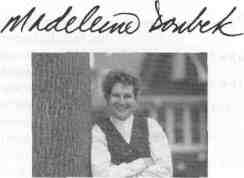|
A VIEW FROM THE SUBURBS
An open congressional seat
sparks an intraparty battle
by Madeleine Doubek Judy Biggert and Peter Roskam are working to push each other to the edge of the GOP's ideological spectrum. The last time an incumbent wasn't running for the DuPage County- dominated 13th Congressional District, Republican state Rep. Peter Roskam had barely received his undergraduate degree. Three of Illinois' congressional seats opened this year, but that remains an unusual occurrence in the suburbs and a rare opportunity. It's one Roskam, now a 36-year-old father of four, practically jumped to grab. When Roskam launched his bid, he lived outside the congressional district from which U.S. Rep. Harris Fawell, a Naperville Republican, is retiring after 14 years. But he began the year of the primary with a quickly arranged move from Winfield to the heart of the district in Naperville. It was, he says, his wife Elizabeth's idea. "I don't want there to be any thought you didn't give it your all," Roskam says she told him. "Let's sell the house." He believes the move will make charges that he is an outsider ring "a lot more hollow." Roskam's primary opponent for the congressional seat, 60-year-old Judy Biggert of Hinsdale, knows full well how much drive Roskam possesses. She has watched him on the Republican side of the aisle in Springfield's State- house for the past five years. She has worked near her fellow Republican, but rarely with him. "We disagree on who should be elected," Biggert says. "Judy and I agree that we're both sincere," says Roskam, "and that's where the agreement ends." Four other suburban men are seeking Fawell's congressional seat, but the battle is between Biggert and Roskam and the contrast is the stuff of classic Republican primaries. Roskam is the fervent conservative who opposes abortion and is backed by the right-wing Republicans who tend to turn out to vote more consistently in primaries. Biggert is the low-key liberal who supports most abortion rights and believes government has a role to play in protecting citizens. Of course, running in a Republican primary, she prefers to call herself moderate rather than liberal, while Roskam prefers to avoid too much blatant focus on their abortion differences in a district whose voters have regularly re-elected socially moderate Fawell. "I don't have to talk about that stuff," he says. "Those people know me." As is the case with the current and previous GOP U.S. Senate primaries and so many other intraparty battles, Biggert and Roskam both are working to push the other to the edge of their party's ideological spectrum. Like his law partner and former legislative colleague Al Salvi did last year, Roskam is trying to convince suburban voters Biggert is tax happy. "Judy has demonstrated a propensity to raise taxes even when you have a budget surplus," Roskam says, noting that a similar budget situation is developing at the federal level. And so Biggert finds herself defending her leadership role in supporting the school funding bill that hiked taxes on cigarettes, casinos and phone messages. "I made a hard choice," she says, "and I think it was really worth it for all the children in Illinois." Roskam turned down several million in funds for the schools in his district, she says. For her part, Biggert will promote her endorsement from Fawell, whose support in the last general election dipped to a low of 60 percent in the district that encompasses most of southern DuPage County and portions of southwest Cook County and northern Will County. Naperville Democrat Susan Hynes ran a respectable race against Fawell then and waits, working in the wings, for another shot this fall. But one of Biggert's former political consultants, Art Hanlon, suggests she'll do well next month as the sole woman in a field of five men. She plans to promote her support from women's groups, knowing that getting more moderate voters to the primary polls is her greatest challenge. And, of course, Biggert will continue to emphasize her decades of community work on social service boards and a school board, and in municipal and state government. All of that, of course, serves to remind voters about the younger Roskam's ambitious jump to Naperville. "I think there's a big difference between representing an area you've lived in for 26 years," Biggert says, "and one where you've lived since Saturday. " Madeleine Doubek is political editor of the Daily Herald,a suburban metro newspaper. Illinois Issues February 1998 / 41
|

